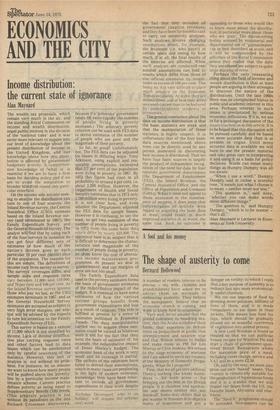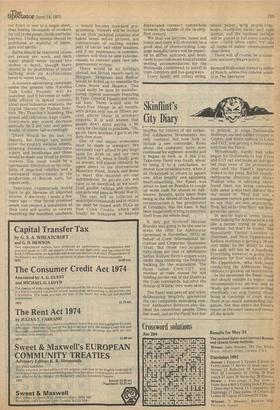A fool and his money
The shape of austerity to come
Bernard Hollowood
A number of readers (eleven to be precise — my wife, children and grandchildren) have asked me to advise them on methods of embracing austerity. They believe the newspapers, believe that an economic crunch is coming, and want to know how to economise.
Very well, let us assume that the pound continues its headlong descent, that the Arabs withdraw their funds, that exporters to Britain insist on prepayment in goods, that unemployment and taxation soar and that Wilson refuses to budge and make room as PM for Len Murray or Clive Jenkins. We return to the siege economy of wartime and I am asked to serve my country at the Ministry of Domestic Propaganda, What do I propose?
First, that we all get into uniform. There's nothing like khaki battledress — for both sexes — for bringing out the best in the British people. It is classless and egalitarian and shows neither dirt nor dandruff, Some may object that to put women in trousers is to deprive males of inspiration and put a damper on virility: to which I reply that a key purpose of austerity is to redirect lust into more economically useful channels.
We cut out imports of food by growing more potatoes, billion of tons of them, and it is made compulsory to eat them in their jackets. This means less food for pigs, which should be gradually phased out as wasteful converters of vegetation into animal protein.
A new Lord Woolton is found or created so that we can publicise honest recipes for Woolton Pie and start a chain of government-sponsored British Restaurants where the maximum price of a meal, including cover charge, service and VAT will be a mere £2.50.
Oh, and by the way, we must also grow our own "baked" beans. This country is climatically suitable for the production of leguminous foods and it is a scandal that we still import our beans from the US, the Danube basin, Abyssinia and elsewhere.
The "Save It" programme should be extended. Newspapers can he cut down in size to a single sheet, thus freeing thousands of workers for toil in the potato fields and bean patches. Trading stamps should be prohibited as wasteful of paper, gum and spittle.
Baths should be restricted to one per person per week, and bath water should never exceed five inches in depth, though there should be no prohibition of mixed bathing with its Archimedean boost to water levels.
A massive advertising campaign under the generic title 'Careless Talk Costs Pounds' will be launched, and it becomes an indictable offence to spread rumours about poor industrial relations, the English Disease, the Hudson Institute, Mrs Thatcher's hoarding, the pound and ridiculous wage claims. Everyone's pay would decrease annually by 2 per cent and prices would, of course, fall accordingly.
There would be no ban on imports, but foreign cars would enter the country without wheels, steering columns, windscreen wipers and headlamps and these would be made and fitted by British workers. The result would be a spectacular diminution in the reliability of imported vehicles and a consequent improvement in the production , of British cars, for export only.
Television commercials would have to go; likewise all imported movies, A discovery I made a few years ago — that lavish screened meals can project a simulation of their taste and quality to viewers munching the humblest sandwich — would become standard programming. Viewers will be invited to eat their jacketed potatoes and baked beans before pictures, not commercials, of sizzling steaks, pots of caviar and other luxuries, and if my experience is common, viewers will then be able subconsciously to convert plain fare into gastronomic ecstasy.
There would be no holidays abroad, but British resorts such as Margate, Skegness and Redcar' would be dolled up to resemble the Costa Brava and Majorca. This could easily be done by manufacturing typical souvenirs featuring El Toro, General Franco and comical hats. There would also be Duty-Free Shops' in all resorts, with prices only ten or fifteen per cent above those in ordinary emporia. It is well known that people don't mind paying a bit extra for the right to proclaim, "Oh, go on, have another: I got it at the duty-free store."
One of our major economies must be made in transport. We obviously can't afford to pay huge sums for Arab oil, and our own North Sea oil, when it finally goes on stream, will almost certainly be piped direct to the International Monetary Fund, Zurich and Bonn to meet the interest on our indebtedness. So private cars will have to be sacrificed, as we sacrificed garden railings and aluminium pots and pans in World War II.
The cars will be collected at municipal compounds and in return we shall be issued with PCCs or Post Crisis Credits, which will finally be honoured in heavily depreciated currency somewhere towards the middle of the twentyfirst century.
We shall use bicycles, buses and trains and there will obviously be a good deal of overcrowding. Luggage manufacturers will be expected to stiffen suitcases and briefcases to provide some kind of stable seating accommodation for the thousands condemned to travel in train corridors and bus gangways.
Every family will collect string, waste paper, milk bottle-tops, bones, dandelion leaves and used stamps, and the national anthem will be played in full every night at nine o'clock when radio, TV and all forms of public entertainment close down.
There will, of course, be a voluntary statutory wages policy.
Bernard Hollowood, formerly editor of Punch, writes this column weekly in The Spectator



























 Previous page
Previous page